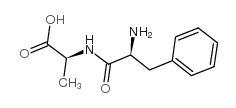Life Sciences
1983-10-17
Analgesic properties of N-terminal substituted phenylalanyl-alanine.
G Borin, P Giusti, L Cima
Index: Life Sci. 33(16) , 1575-80, (1983)
Full Text: HTML
Abstract
Phenylalanylalanine, an in vitro inhibitor of enkephalinase, and some of its N alpha-derivatives are shown to possess an analgesic action when injected i.p. and i.c.v. into mice in the presence or absence of Leu5-enkephalin. In the second case a synergistic response is observed. The intensity of the analgesic response depends markedly on the nature of the N-terminal substituent which affects the hydrophobic character of the resulting dipeptide, its subsequent transport and probably its rate of biotransformation by cleaving enzymes.
Related Compounds
| Structure | Name/CAS No. | Molecular Formula | Articles |
|---|---|---|---|
 |
Phe-Ala
CAS:3918-87-4 |
C12H16N2O3 |
Related Articles:
More...
|
Alkali metal complexes of the dipeptides PheAla and AlaPhe: ...
2008-03-14 [ChemPhysChem 9 , 579-589, (2008)] |
|
Single-conformation ultraviolet and infrared spectroscopy of...
2008-04-09 [J. Am. Chem. Soc. 130(14) , 4795-807, (2008)] |
|
A novel inhibitor of the mammalian peptide transporter PEPT1...
2001-04-10 [Biochemistry 40(14) , 4454-8, (2001)] |
|
P3 cap modified Phe*-Ala series BACE inhibitors.
2004-01-05 [Bioorg. Med. Chem. Lett. 14(1) , 245-50, (2004)] |
|
Dipeptide transport characteristics of the apical membrane o...
1995-08-01 [Am. J. Physiol. 269(2 Pt 1) , L137-43, (1995)] |